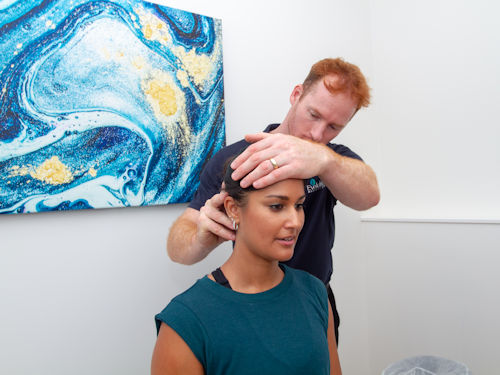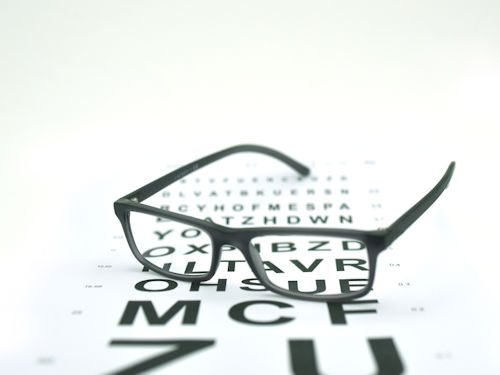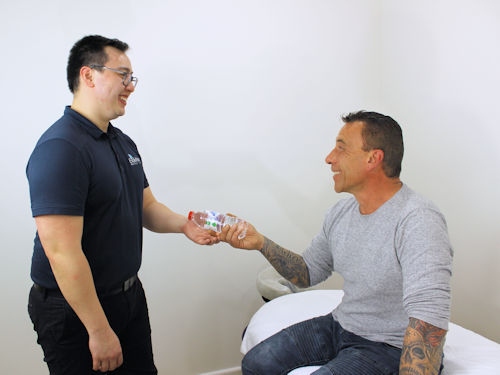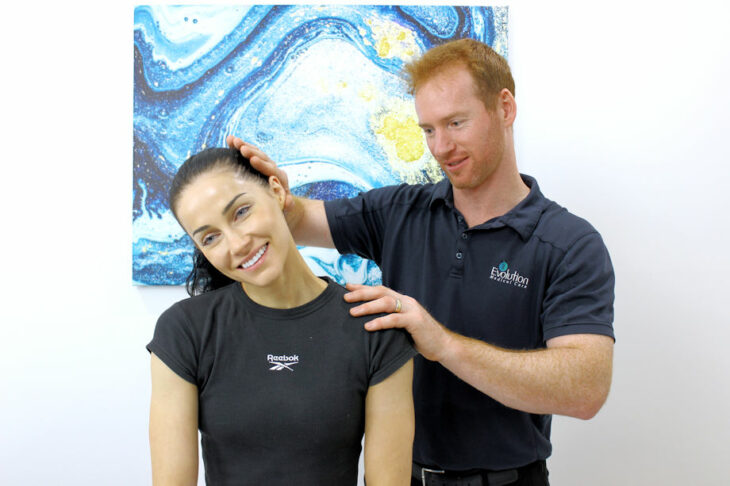Very commonly at our clinic we see people with neck concerns that impact their everyday lives. Neck pain is a common occurrence that is caused by many different factors. The majority of people will experience neck pain in some form at some stage in their lifetime. It’s no surprise either, given the complexity of the structures of the neck and the job it does for us. The neck is made up of 7 bones (vertebrae), each located one above the other. The neck also consists of multiple muscles, ligaments, and tendons. This helps not only just support the head, but also the overall range of motion of the neck and head. Given that there’s a lot going on, there’s potential for a lot to go wrong.
A large percentage of the clients we see will try “old-fashioned” techniques to get some much-needed relief. This could be done by getting their friend or family member to “crack their neck” or “stretch them out.” Other times, self-medication is a common go-to. This may include medication from a local pharmacy or from “a friend of a friend.”
Self-medication can be extremely dangerous. Self-medication or “self-cracking” should NOT be attempted! This can lead to a much worse outcome for your neck pain. There are however some simple tips and tricks that can help you get on top of your neck pain!

If you’re ready to say goodbye to neck pain, keep reading because I have gone ahead and written down my NINE TOP TIPS to help you overcome this!
Be Picky With Your Pillows
When we use too many pillows under our head whilst at rest or sleeping, it can lead to muscle stiffness and may even limit our neck’s range of motion. Having the correct pillow is key to maintaining the neck in a more supported position throughout the night, by having the neck in a neutral alignment during sleeping hours. Without the correct pillow support, muscles in the neck may begin to stress and tighten, thus aggravating any existing pain or even worse, creating new pain. This may lead to ongoing pain throughout the day, along with neck stiffness.
When sleep problems start to occur, due to poor pillow choice, it can lead to an elevated risk of various other conditions, including headaches and musculoskeletal pain.
Select a Supportive Chair
There are a wide variety of desk chairs out there, with some being more supportive than others. Chairs that have minimal back support cause our heads to protrude forward, which adds additional strain on the neck and spine.
By using a supportive and well-designed desk chair, you allow the spine to maintain a healthy posture, keeping the spine in its s shape, and promoting a more natural and balanced position for your head, which causes less fatigue on the back and neck.
It’s also worth applying a headrest to your chair. This will allow your spine and neck to stay in a more neutral position and reduces the frequency and severity of neck pain caused by sitting for too long. My tip would be to keep the back of your head firmly on the headrest, with the ears directly above the shoulders. The same benefits can also be achieved by applying an additional headrest to your car seat also, not just your desk chair.
Work at the Right Height
There are a lot of people whose work requires them to stare at a computer screen all day. If this is you, be sure to adjust the screen so it is at eye level. Most commonly, computer monitors are placed too low- especially whilst using a laptop. This can place excessive strain on the neck muscles, causing fatigue and irritability.
It may be worth considering having a sit/stand desk. Being able to alternate positions will lead to a more healthy postural position which may limit the amount you hunch over your desk, and of course, reduce the overall strain placed upon your neck.
Correct Prescription for Your Specs

What do Specs have to do with neck pain you say?
So many people will stretch their head forward more when their glasses prescription is not up to date. By constantly leaning in to read or observe something, the neck is placed under the stress of trying to balance the weight of the head, which is a massive contributor to neck pain. It’s a simple solution. If you find yourself leaning in to read the computer or phone, and this is causing your neck pain, seek assistance from your optometrist.
Make Relaxation Time a Priority
Give yourself time after a big day at work. Find a space that is quiet, to regain focus and relax not only the body but also the mind. This may help ease any stresses you’re feeling, whilst bringing new perspectives to what is causing stress.
Relaxation time could include things like:
- Yoga
- Breathing exercises
- Light stretching
- Pilates
- Acupuncture
Limit Tech Device Use
Most of us don’t realise how much screen time we’re clocking up, using a variety of devices, whether that be a mobile phone, tablet, or laptop. Without being conscious of it, your neck may be getting aggravated through constantly bending your head forward whilst using those devices. Repetitive and excessive use causes the head to tilt forward, putting excess stress and strain on the neck.
A few ways we can avoid this include:
- Using handsfree options whenever on your mobile phone
- Take frequent breaks whilst using your device – getting up and stretching your neck in intervals throughout the day.
- Hold your phone on a higher angle/try to minimise looking down at your phone. Try holding your phone in front of you, directly in line with your eyes
Increase Hydration Levels

Low amounts of water in the body can lead to the development of tight tendons, ligaments, and muscles, which in turn limits the range of motion of the neck. Aim to drink at least 1.5 litres of water per day, which will help avoid dehydration.
The importance of maintaining good hydration cannot be emphasized enough! Not only will it help prevent neck pain, but hydration levels are also dependent on maintaining spinal alignment, through nourishing the body. In fact, up to 60 per cent of our entire body is made up of water! Staying hydrated is an often overlooked but a highly effective way of dealing with neck pain.
Magnesuim!
Magnesium is an essential mineral for muscular function and is useful for lowering muscle discomfort and cramping. It helps regulate nerve impulses, muscular contractions, and blood flow, so relieving muscle discomfort and stiffness. Magnesium is also known to have anti-inflammatory qualities, which may help to alleviate muscular discomfort and stiffness, particularly in the neck. Low magnesium levels are also connected with persistent neck pain, and supplementation with magnesium may help to alleviate symptoms of neck discomfort.
Managing stress and reducing overall pain, can be attributed to the huge role which magnesium plays in the body. This can be associated with chronic neck pain. Many people will increase their overall level of daily magnesium intake for this reason.
When you increase your level of magnesium, it can help the body lower the overall inflammation which you may be experiencing. Therefore, this supplement is highly sought after when suffering from neck pain. It is true that magnesium can be found in various foods, though this may not be enough to appropriately increase the levels in the body.
See an Acupuncturist
The common belief is that Acupuncture is sort after for treatment to assist with rehabilitation from injuries. Whilst this is true, Acupuncture is beneficial in many more ways!
When receiving Acupuncture treatment from an Acupuncturist for neck pain relief, you can also experience further benefits like:
- Correcting poor habits or posture which could be contributing to your tightness or pain
- Teaching you methods on how to reduce your chances of aggravating the injury further
- Identifying and strengthening weakness which could be exacerbating neck concerns, with targeted exercises and stretches.
Improving the neck’s range of motion and strength can allow for greater support of the cervical spine, thereby reducing overall neck pain. Some studies show that Acupuncture may be beneficial for neck pain, in collaboration with other modalities such as strength training.
A trained Acupuncturist will use a variety of treatment methods to assist with neck pain, such as:
- Gua Sha – This involves a trained Acupuncturist using a tool to apply downward pressure on the area of concern, using short strokes along the skin. Gua Sha is a common treatment method in Traditional Chinese Medicine and is used to target specific areas of pain in the body, helping by creating blood circulation to problem areas which have become stagnant and energy is “stuck” (Qi)
- Acupuncture – This is performed with small/thin needles, which are applied to the pain or distal points around the entire body to relieve pain.
- Cupping – Help move blood and release tension in the upper back/neck area.
Fed Up With Neck Pain?
Neck pain is extremely debilitating and can become chronic if the appropriate corrective actions aren’t taken. Your healthcare provider can aid in helping with symptoms and prevent any further issues associated with episodes of neck pain. There are different types of contributing factors to neck pain, so we recommend speaking with a healthcare professional to get on top of your pain.
If you would like to learn how we can help you, please call our friendly team on (02) 4709 6727.







